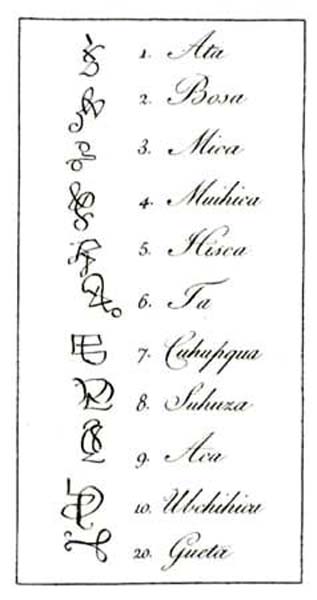Bernardo de Lugo on:
[Wikipedia]
[Google]
[Amazon]
 ''Fray'' Bernardo de Lugo (born late 16th century, New Kingdom of Granada) was a Spanish Neogranadine
''Fray'' Bernardo de Lugo (born late 16th century, New Kingdom of Granada) was a Spanish Neogranadine
Instituto de lenguas Bernardo de Lugo - Universidad Santo Tomás
/ref>
Numerals in Chibcha: 1-399
{{DEFAULTSORT:Lugo, Bernardo de Colombian Roman Catholic missionaries Linguists from Colombia History of Colombia Muisca scholars 16th-century births 17th-century deaths _ Roman Catholic missionaries in Colombia Dominican missionaries Colombian Dominicans Missionary linguists
 ''Fray'' Bernardo de Lugo (born late 16th century, New Kingdom of Granada) was a Spanish Neogranadine
''Fray'' Bernardo de Lugo (born late 16th century, New Kingdom of Granada) was a Spanish Neogranadine linguist
Linguistics is the scientific study of human language. It is called a scientific study because it entails a comprehensive, systematic, objective, and precise analysis of all aspects of language, particularly its nature and structure. Linguis ...
, friar
A friar is a member of one of the mendicant orders founded in the twelfth or thirteenth century; the term distinguishes the mendicants' itinerant apostolic character, exercised broadly under the jurisdiction of a superior general, from the ...
and writer. He has been an important contributor to the knowledge about the Chibcha language
Chibcha, Mosca, Muisca, Muysca (*/ˈmɨska/), or Muysca de Bogotá, was a language spoken by the Muisca people of the Muisca Confederation, one of the many indigenous cultures of the Americas. The Muisca inhabited the Altiplano Cundiboyace ...
(also called "Muisca" or in its own language "Muysccubun") of the Muisca
The Muisca (also called Chibcha) are an indigenous people and culture of the Altiplano Cundiboyacense, Colombia, that formed the Muisca Confederation before the Spanish conquest. The people spoke Muysccubun, a language of the Chibchan langu ...
, having published the oldest surviving work on the language in 1619.
Later linguists and chroniclers, such as Ezequiel Uricoechea, based their work on the texts of Bernardo de Lugo. Various modern scholars have reprinted the work or published reviews, among others Jorge Gamboa Mendoza
Jorge Augusto Gamboa Mendoza (born 27 January 1970) is a Colombian anthropologist and historian. He has been contributing on the knowledge of hispanic and pre-hispanic territories of what is now Colombia, especially the Muisca.
(2010), Nicholas Ostler (1995) and Manuel Alvar (1977).
Biography
Little is known about the life of Bernardo de Lugo, born late in the sixteenth century in the New Kingdom of Granada, where he became a Dominican friar. In 1615 De Lugo starting preaching in Chibcha after being appointed as ''magister linguae indorum''. On August 1, 1617, friar Gabriel Giménez send him an omission to write a book on the Chibcha language and grammar. De Lugo finished his work early 1618 and the manuscript was sent toMadrid
Madrid ( , ) is the capital and most populous city of Spain. The city has almost 3.4 million inhabitants and a Madrid metropolitan area, metropolitan area population of approximately 6.7 million. It is the Largest cities of the Europ ...
, Spain
, image_flag = Bandera de España.svg
, image_coat = Escudo de España (mazonado).svg
, national_motto = ''Plus ultra'' (Latin)(English: "Further Beyond")
, national_anthem = (English: "Royal March")
, i ...
where it was edited by Bernardino de Guzmán and published in 1619. Bernardo de Lugo was unable to correct the proofs of the work and under the strict royal privilege it was forbidden to reprint the work for ten years, fined by 50,000 maravedis. An accompanying catechismus and dictionary are said to have been written but those weren't published.Ostler, 1995, p.1
The work on Chibcha is the oldest surviving transcript of the extinct indigenous language. Historical records show that twelve earlier works must have existed but they do not remain. Earlier writers about the Chibcha language were among others Gonzalo Bermúdez and José Daddei. De Lugo's book, ''Gramática en la lengua general del Nuevo Reyno, llamada mosca'' ("Grammar in the general language of the New Kingdom, called Mosca uisca), started with three sonnets; one in Spanish and two in Chibcha. The Chibcha language is written in a transcription. The book contains 162 pages.
The first sonnet in Chibcha, throughout the book called Chibcha and Muisca, begins with:
MVγ≈ca micâta cubun cħoqγ vca≈ûcaThe sonnets praise the person Bernardo de Lugo, suggesting they were written by a friendly colleague. The only reference in the text to the author is ''chicubun'', which means "our language". Alvar described the work of De Lugo as "de Lugo writes for those who don't understand Chibcha".
Trivia
The language institute of theUniversidad Santo Tomás
Saint Thomas University ( es, Universidad Santo Tomás) is a Roman Catholic university located in Bogotá, Colombia. It is the oldest Colombian university, founded in 1580 by the Dominican Order. It has campuses in Bucaramanga, Tunja, Medellín ...
in Bogotá has been named honouring Bernardo de Lugo/ref>
See also
*List of Muisca scholars
This list contains Muisca and pre-Muisca scholars; researchers, historians, archaeologists, anthropologists and other investigators who have contributed to the current knowledge of the Muisca and their ancestors of the prehistory of the Altiplano ...
*Chibcha language
Chibcha, Mosca, Muisca, Muysca (*/ˈmɨska/), or Muysca de Bogotá, was a language spoken by the Muisca people of the Muisca Confederation, one of the many indigenous cultures of the Americas. The Muisca inhabited the Altiplano Cundiboyace ...
* Muisca numerals
References
Bibliography
* * * *External links
Numerals in Chibcha: 1-399
{{DEFAULTSORT:Lugo, Bernardo de Colombian Roman Catholic missionaries Linguists from Colombia History of Colombia Muisca scholars 16th-century births 17th-century deaths _ Roman Catholic missionaries in Colombia Dominican missionaries Colombian Dominicans Missionary linguists